Water softeners can secretly damage your plumbing through chemical reactions that acidify water and dissolve protective mineral layers. They remove essential calcium carbonate buffers while introducing corrosive sodium ions that increase conductivity and accelerate oxidation. Without proper maintenance, broken resin beds circulate damaging sludge through pipes, while incompatible systems can make municipal water excessively corrosive. These issues lead to leached metals and potential health hazards lurking throughout your home’s water system.
Key Takeaways
- Water softeners can trigger chemical reactions that dissolve protective mineral deposits inside pipes, exposing them to corrosion.
- Sodium ions from softeners increase water conductivity, accelerating oxidation and corrosion in metal plumbing systems.
- Neglected maintenance of resin beds can release damaging sludge throughout your plumbing system.
- Water softeners may be incompatible with your specific plumbing materials or already pre-softened municipal water.
- Softened water can increase leaching of harmful metals like lead and copper into drinking water.
The Hidden Chemical Warfare in Your Plumbing System
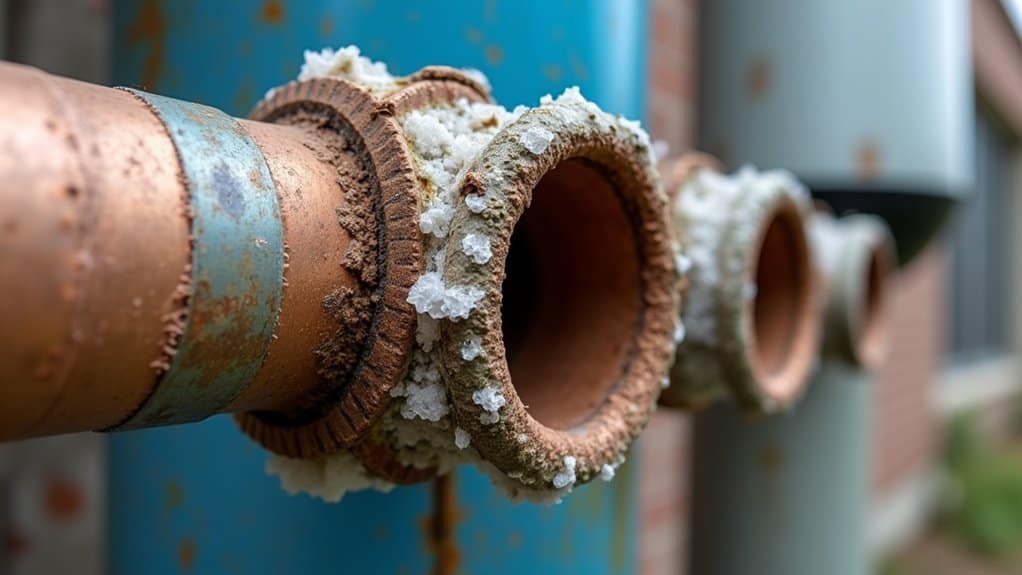
While many homeowners install water softeners to protect their plumbing, these systems actually initiate a complex series of chemical reactions that silently damage pipes from the inside out.
What’s happening? Softened water acidifies your system, dissolving the protective mineral layers inside pipes. Without calcium carbonate buffers, copper and lead leach more readily into your water. This is particularly concerning because the presence of calcium carbonate is essential for maintaining pipe integrity.
Simultaneously, softeners remove residual chlorine, eliminating a crucial disinfection barrier.
We’re seeing accelerated corrosion particularly in homes with older plumbing. This process can lead to elevated lead levels in your drinking water, posing significant health risks. The irony? The very system meant to prevent scale buildup is creating a more aggressive solvent that attacks your pipes.
When Salt Becomes Your Pipes’ Worst Enemy
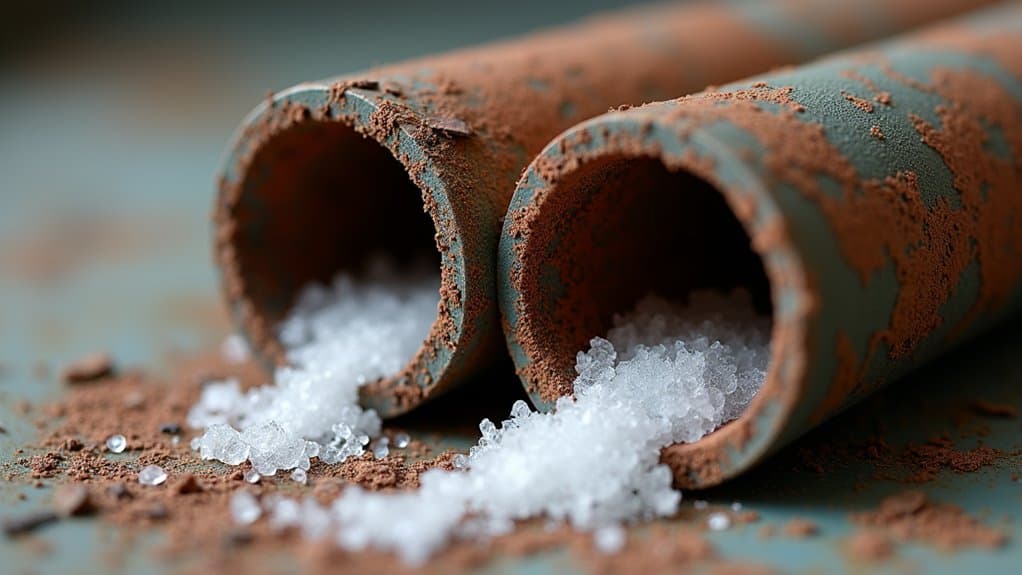
How exactly does the salt in your water softener damage your home’s plumbing system? The sodium ions introduced during softening increase water conductivity, accelerating oxidation in metal pipes. This creates perfect conditions for corrosion.
When calcium is removed, softened water becomes more aggressive, dissolving protective mineral deposits that naturally coat pipe interiors. This exposes bare metal to corrosion. Additionally, enhanced water conductivity can lead to increased rates of wear on plumbing fixtures and appliances.
The problem worsens in older homes with lead solder joints, copper, or galvanized pipes. This can lead to leached metals entering your drinking water, posing significant health risks especially when the water is heated.
Cast iron pipes face faster deterioration as sodium promotes electrolysis of metal components, leading to premature pipe failure and potential metal contamination in your drinking water.
The Maintenance Myth: How Neglect Accelerates Damage
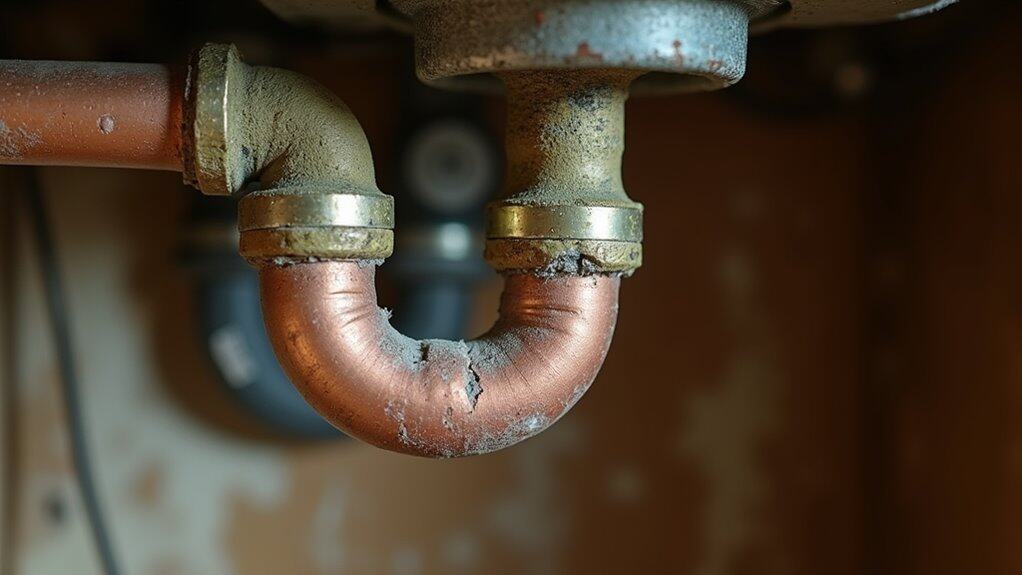
Many homeowners believe regular maintenance for water softeners is optional rather than mandatory—a dangerous misconception that compounds pipe damage.
Neglected resin beds break down into brown sludge that circulates through plumbing, while unchecked salt bridges prevent proper regeneration cycles. In fact, quality water softeners can help mitigate these issues by ensuring effective ion exchange.
When resin can’t exchange ions effectively, calcium and magnesium simply recalcify pipes, narrowing passageways and reducing water pressure.
Iron-contaminated resin accelerates corrosion in metal pipes, while bacterial growth in unmaintained systems contaminates water.
The consequences? Clogged fixtures, strained components, and costly emergency plumbing repairs.
Regular maintenance isn’t just about protecting your softener—it’s about preserving your entire plumbing system from preventable deterioration.
The degraded resin appears as a brown liquid in old water softeners, signaling an urgent need for service before it enters your home’s water distribution system.
Mismatched Systems: Why Your Water Softener Could Be Wrong for Your Home
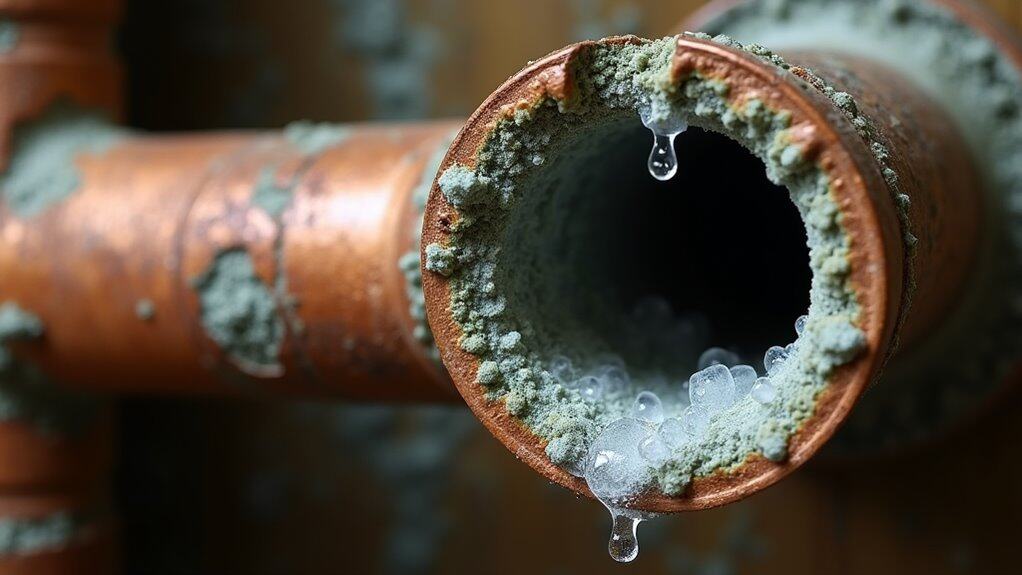
Not every water softener is created equal for your specific plumbing system. Matching your softener to your home’s unique water chemistry and plumbing configuration prevents expensive damage. Water softeners require ongoing maintenance for optimal performance to prevent system failure and resulting pipe damage.
- Pre-softened municipal water becomes dangerously corrosive when further softened, stripping protective mineral barriers from pipes.
- Copper plumbing requires a 2-4 week delay before softener installation to allow protective patina formation.
- Undersized systems fail during peak demand, leaving mineral residue that damages pipes inconsistently.
- Mixed pipe materials (copper, PVC, PEX) corrode at different rates under softened conditions, creating weak points.
Frequently Asked Questions
Can Softened Water Damage Copper or PEX Plumbing Systems?
Yes, softened water can damage copper pipes through pitting and leaching. We’ve found it promotes pinhole leaks and corrosion in copper systems, while PEX remains unaffected by softening.
How Does Water Softener Brine Affect Septic System Bacteria?
We’ve found that properly operating water softeners don’t harm septic bacteria. The calcium in brine actually counteracts sodium’s inhibitory effects, maintaining healthy microbial activity despite minor increases in hydraulic load.
Does Softened Water Increase Lead Leaching From Older Fixtures?
Yes, we’ve found softened water increases lead leaching. It removes calcium/magnesium minerals that buffer corrosivity, making water more aggressive toward older fixtures containing lead components, especially brass faucets and soldered joints.
Can I Install a Water Softener Myself Legally?
We don’t recommend DIY installation. Most jurisdictions require permits and professional installation to meet building codes. Self-installation typically voids warranties and creates liability for water damage or contamination issues.
How Often Should Softener Resin Be Replaced Completely?
We recommend replacing water softener resin every 10-15 years under normal conditions. With high-hardness water, replace every 5-10 years. Monitor for reduced performance, pressure loss, or increased salt consumption as indicators.
Conclusion
We’ve shown how salt-based softeners can accelerate pipe corrosion through increased sodium content and chemical interactions. Regular maintenance isn’t just recommended—it’s essential to prevent accelerated deterioration. Most importantly, your home’s specific plumbing composition and water chemistry require a tailored solution. Consider consulting with a water treatment professional to evaluate whether you’re using the right system or if alternative technologies would better protect your investment.

Craig “The Water Guy” Phillips is the founder of Quality Water Treatment (QWT) and creator of SoftPro Water Systems.
With over 30 years of experience, Craig has transformed the water treatment industry through his commitment to honest solutions, innovative technology, and customer education.
Known for rejecting high-pressure sales tactics in favor of a consultative approach, Craig leads a family-owned business that serves thousands of households nationwide.
Craig continues to drive innovation in water treatment while maintaining his mission of “transforming water for the betterment of humanity” through transparent pricing, comprehensive customer support, and genuine expertise.
When not developing new water treatment solutions, Craig creates educational content to help homeowners make informed decisions about their water quality.


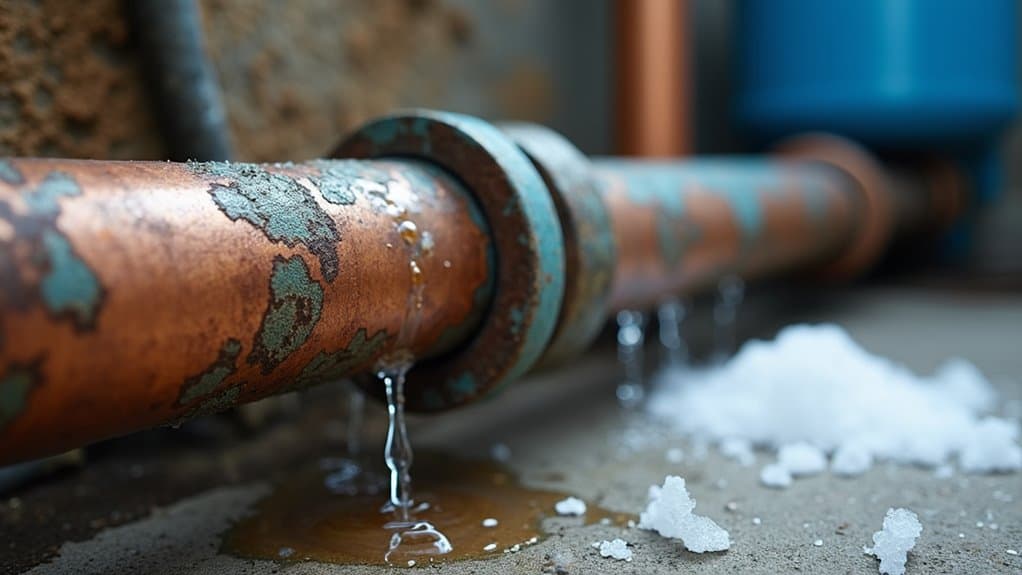
certainly like your website however you have to test the spelling on several of your posts. A number of them are rife with spelling problems and I in finding it very troublesome to tell the truth nevertheless I抣l surely come back again.